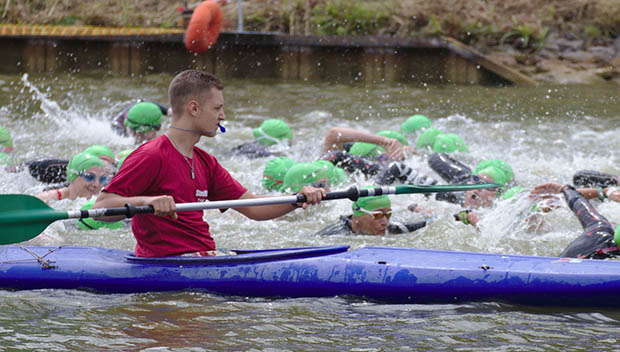
While there are a lot of facts about triathlon, there are just as many myths. Here are a few of the most common misconceptions—and the truth behind their origins.
Myth: You need to train a specific number of hours per week.
Fact: You need to train as much as you (or your coach) feel is necessary to meet your goals while also balancing other daily life demands.
Myth: You need to train all three disciplines equally.
Fact: You need to train your weaknesses, and polish your strengths. If you come from a running background, spend time in the pool. If you're a strong cyclist, consider being conservative on the bike and saving your legs for the run.
Myth: You're not a real triathlete until you've completed a 140.6 distance race.
Fact: You're a triathlete if you swim-bike-run any distance.
Myth: Triathlon is too expensive.
Fact: You can be a triathlete on a budget and also be successful. Only if you want—and have the money to spend—to pursue your passion do tri gear and race entries become expensive.
Myth: You don't need nutrition for a sprint triathlon
Fact: If you're completing a sprint triathlon in about an hour, in-race nutrition is not as big a factor. If you're much over the 75-minute mark, some sport nutrition and being hydrated is never a bad idea.
Myth: Triathlon swims are a risky free-for-all.
Fact: All swims—even pool swims—have an element of risk. If you're uncomfortable swimming in a pack, you can swim to the outside or the back of the group for a little more room and peace of mind.
Myth: All triathlon swims are open water swims.
Fact: Many triathlons—especially beginner races—offer pool swims.
Myth: You'll be DQ'd for using a wetsuit in warm water.
Fact: For most USAT-sanctioned races, wetsuits can be used if the water is less than 78 degrees Fahrenheit; above 78 and you might be given the option to use a wetsuit but would not be eligible for an age group award. If the water temps are above 84 degrees, wetsuits are prohibited for safety reasons.
Myth: You need to have an expensive bike.
Fact: While a fancy bike is nice to have, it's not a requirement. And, sure, a new triathlon bike will likely shave minutes off your time, but so will improving your run.
Myth: You need to have the lightest bike possible.
Fact: Weight is not nearly as important as aerodynamics—even on bike courses with climbs—for going fast in a solo effort.
Myth: You need to have all the bike accessories—powermeter, race wheels, nutrition storage, aero helmet, etc.-—o be competitive.
Fact: You need only a bike, helmet, a bottle cage, a spare tube and a CO2 cartridge. Tri shoes and clipless pedals will help, but they are not a requirement.
Myth: You'll pee on your bike.
Fact: For longer events, like a 70.3 or a 140.6, you gotta do what you gotta do. But for shorter events, hit the porta potty before you line up to race, and you should be OK until after you've crossed the finish line.
Myth: You need to run immediately after every bike workout.
Fact: You should do what your coach recommends. If you don't have a coach, check out an online training plan for ideas or advice.
Myth: You need to do speed/track running workouts.
Fact: If you want to boost your top-end speed, which is important for shorter events, speedwork will help you get faster.
Myth: If you want to get faster, you should always run with faster runners.
Fact: If you're always running faster than your abilities, you're likely doing too much hard running and not recovering as effectively as you could be. It's OK to run with faster runners sometimes, but also vary your pace and distances or times so you can optimize your running.
Myth: You need to have previously run a marathon to be able to complete a 140.6 distance race.
Fact: Recovering from a marathon could take weeks and will impact your triathlon training. If you don't come from a running background and have not previously run a marathon, don't worry.
Myth: Triathlon is a runner's sport, and to be successful you have to come from a running background.
Fact: No. Triathlon has three disciplines, and athletes of all backgrounds can participate, be successful and have fun!
READ THIS NEXT: 7 Triathlon Nutrition Myths and Misconceptions


